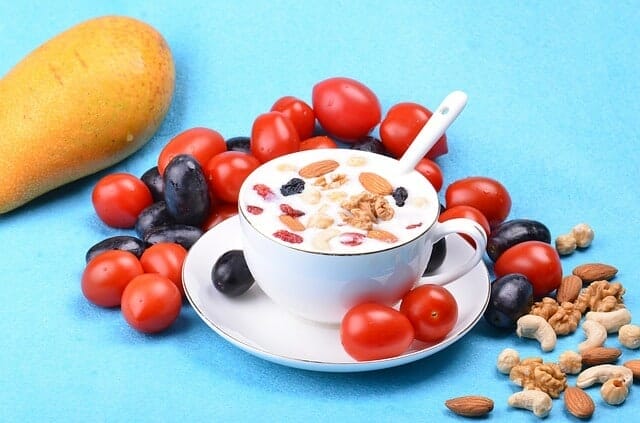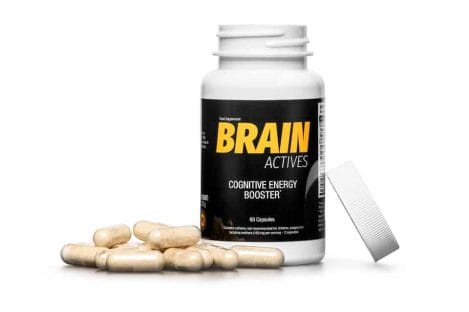Diet for the Brain supports the intellect and has a positive effect on concentration and memory. Not everyone realizes how much a properly balanced diet has to do with optimal functioning of the mind. Are you familiar with the feeling of brain fog and difficulties with efficient formulation of thoughts? Do you have days when it’s hard to focus? Do you struggle with problems with remembering and absorbing new knowledge? Are you familiar with the state of mental exhaustion and decreased mental efficiency? If so, a special diet for the brain, providing large doses of fuel for the grey cells, is for you! Check out how to compose a menu!
Table of contents
- 1 Diet and the brain – how the content of our plate affects mental performance?
- 2 Minerals for the brain
- 3 Vitamins for the brain
- 4 Unsaturated fatty acids in the diet for the brain
- 5 Lecithin as a support for the busy brain
- 6 What other dietary components have a positive effect on the work of the brain?
- 7 Diet for the brain – menu
- 8 Brain support supplements
Diet and the brain – how the content of our plate affects mental performance?
Diet is one of the main factors on which depends the state of our health. Everyday diet also has an influence on better or worse mental condition. Nutrients such as sugars, vitamins, minerals and unsaturated fatty acids have many important functions for the brain, including providing it with energy and enabling the efficient flow of impulses between neurons.
If we consume too few nutrients important for the brain, the work of the organ deteriorates, which results in a number of unfavourable symptoms such as, among others:
- irritability,
- sluggishness,
- impaired memory and concentration,
- slowed thought processes,
- slower reactions,
- decreased alertness, mental sharpness, feelings of dullness,
- mental exhaustion,
- bad mood, apathy,
- decreased creativity.
The worst diet for the brain is a diet based on processed foods, full of chemicals and unhealthy types of fats and carbohydrates, containing zero or trace amounts of valuable nutrients. Processed foods include fast food, the whole range of ready-made and semi-prepared meals (e.g. boxed soups, instant microwave meals, convenience foods, etc.), as well as products made from refined white flour, sweets, crisps and other salty snacks, coloured drinks, processed meats such as tinned foods, sausages, baked goods, pâtés, finely ground, low-quality sausages, etc.
If we want to support our brain, the above-mentioned foods with a high degree of processing and high content of artificial substances should disappear from our menu. If we replace them with natural products, rich in healthy types of carbohydrates, vitamins, micro- and macroelements, proteins or good types of fats, we can relatively quickly count on the elimination of symptoms interfering with our daily functioning, such as continuous sleepiness and fatigue, decreased mental productivity or lowered mood.
In the following part of the article you will read about which nutrients and which products are most beneficial for the brain and increase intellectual performance.
Minerals for the brain

Magnesium is one of the most important dietary components for proper brain function. It protects the nervous system, guards the correct transmission of impulses between neurons, and regulates the amount of released neurotransmitters. It reduces fatigue, improves mood, reduces stress levels, and combats irritability. It increases mental efficiency, has a positive effect on concentration, memory process and absorption of information.
Products rich in magnesium are:
- bananas,
- nuts,
- oatmeal,
- bran,
- sunflower seeds, pumpkin seeds,
- brown rice, buckwheat, barley groats,
- cocoa, dark chocolate,
- legumes.
Another important mineral for the brain is potassium. It is one of the basic electrolytes responsible for proper hydration of the body and maintaining undisturbed nerve functions. Thanks to potassium, brain cells receive an optimal amount of oxygen, which determines their efficient functioning, which in turn translates into maintaining high mental performance. It also ensures the correct transmission of electrical impulses between neurons, with positive effects on concentration and the quality of thought processes.
Food sources of potassium are abundant:
- cocoa and dark chocolate,
- Walnuts,
- wholemeal bread, groats, cereals and bran,
- potatoes,
- lentils, peas, soybeans, beans,
- tomatoes,
- bananas,
- kale,
- spinach,
- celery,
- botanicals and beets,
- parsley,
- watercress,
- dried fruit,
- grapefruit,
- kiwi.
A diet for the brain should also not avoid foods rich in Zinc. It is an essential micronutrient that plays an important role in all metabolic processes taking place in the body. Zinc is also of great importance for the proper functioning of the intellect. The element influences the proper functioning of the nervous system, takes care of an undisturbed transmission of nerve signals in some areas of the brain and has a positive effect on mental processes and mental productivity. What’s more, it has a positive effect on our mood, relieves stress, and prevents depressive states.
A lot of zinc can be found in:
- meat and offal,
- seafood,
- pumpkin seeds,
- sunflower seeds,
- sesame seeds,
- yellow cheese,
- whole grain products,
- eggs,
- oyster mushrooms.
Another important mineral for our brain is calcium which takes part in the transfer of nerve impulses and ensures that neurotransmitters are secreted in correct amounts. Thanks to these functions calcium positively influences memory and concentration, contributes to improvement of mental processes and helps in learning and mental work.
Products rich in calcium are:
- milk,
- cheeses,
- cheese, buttermilk, yoghurt, kefir,
- fish,
- almonds,
- nuts,
- seeds chia,
- spinach,
- chives,
- parsley.
When composing a diet aimed at improving mental fitness it is also worth adding to the menu products rich in iodine (sea fish, seafood, yellow cheese, eggs, hazelnuts) and copper (liver, sunflower seeds, wheat bran and germ, oatmeal, cocoa). Both elements support the nervous system and improve brain function.
Vitamins for the brain
An extremely important role in proper brain function is played by B vitamins, mainly:
- vitamin B1,
- vitamin B6,
- folic acid,
- niacin,
- vitamin B12.
B vitamins are responsible for stable functioning of the nervous system and protect neurons against aging processes. They participate in transmission of nerve signals, supporting cognitive functions such as memory, thinking, attention, perception.
What is more, they supply nerve cells with adequate amounts of energy, thus influencing undisturbed brain operation and high intellectual performance. Valuable advantages of B vitamins also include: reducing stress and restoring mental balance, improving mood, alleviating nervous tension, depression, feelings of fear and anxiety, and depressive states.
The best sources of B vitamins are:
- whole grain products (e.g. bran, cereals, wholemeal bread, groats),
- nuts,
- seeds, seeds (e.g. sunflower seeds, hemp seeds, pumpkin seeds, flax seeds, sesame seeds),
- legumes,
- leafy vegetables,
- eggs,
- milk and dairy products,
- liver,
- poultry,
- fish.
Vitamin C is another vitamin that your brain diet should include. It is a powerful antioxidant that protects our nerve cells from degeneration and aging. It supports proper brain function, participates in the synthesis of important neurotransmitters and aids in the transmission of nerve impulses. It regulates the mood, has a positive effect on memory and concentration, and improves intellectual abilities.
A lot of vitamin C can be found in such products as:
- citrus fruits,
- black currants,
- rosehips,
- strawberries,
- kiwi,
- peppers,
- parsley,
- kale,
- Brussels sprouts,
- broccoli,
- cabbage,
- tomatoes.
An important role for the brain plays also the so-called sun vitamin, or vitamin D. It supports the proper functioning of the nervous system, protects against neurological disorders, improves mental condition, strengthens memory, improves cognitive processes, regulates mood, supports us during a great mental effort.
Vitamin D is produced in the body during exposure to the sun. In addition, it can be found in such products as:
- sea fish,
- egg yolk,
- butter,
- cod liver oil,
- yellow cheese.
To a menu beneficial for the brain it is also worth adding large amounts of products containing vitamin E. It is an antioxidant, which protects neurons from oxidative stress, prevents aging processes, and cell damage. What is more, vitamin E participates in the process of oxygen supply to brain cells, so it has a positive effect on memory and concentration, and increases mental productivity.
Sources of vitamin E include:
- seeds and seeds,
- nuts,
- almonds,
- groats,
- whole grain breads,
- bran,
- wheat germ,
- oil and vegetable oils,
- raspberries,
- green vegetables,
- sprouts,
- milk,
- fish.
Unsaturated fatty acids in the diet for the brain

Much is said about the harmfulness of fats to our body. Indeed, some types of fats are bad for health and we should avoid them. This applies mainly to the so-called trans fats formed as a result of the process of hardening of vegetable oils. With caution we should also reach for animal fats, whose excess may affect the development of overweight and obesity, contribute to increased cholesterol and increase the risk of cardiovascular disease.
However, there is also a group of beneficial fats, which are definitely worth including in the daily menu, because in many respects they support our health, and one of their main advantages is to improve the work of the brain.
Especially beneficial for our intellect are unsaturated fatty acids omega 3 and omega 6, which large amounts can be found in cold-pressed vegetable oils. Omega 3 and omega 6 fatty acids are part of the structure of brain tissue, they are responsible for maintaining proper brain function and undisturbed work of the central nervous system.
Adding omega 3 and 6 fatty acids to a daily diet is a method for improving cognitive processes, increasing mental efficiency, better concentration and memory, and reducing the so-called mental fog, dementia or problems with analyzing, associating, formulating thoughts or assimilating information.
Sources of unsaturated fatty acids are:
- flaxseed oil,
- sunflower oil,
- rapeseed oil,
- soybean oil,
- peanut oil,
- olive oil,
- coconut oil,
- nuts,
- almonds,
- seeds, pips,
- fish (e.g. herring, sardines, mackerel, salmon),
- seafood,
- avocado.
Lecithin as a support for the busy brain
Lecithin is a substance particularly valuable for people exposed to high mental effort and struggling with memory deterioration and reduced brain efficiency due to high levels of stress, fatigue, advanced age. Lecithin is a substance from the group of phospholipids, which is currently obtained mainly from soybeans. Lecithin is a component of cell membranes of all body cells, including of course the cell membranes of neurons.
Supplied in food or supplements lecithin results in the strengthening, better nourishment and greater resistance to the degenerative processes of nerve cells, and also promotes the formation of new neurons and new connections between them. Thanks to lecithin, we can count on a more efficient work of the brain and an increase in its productivity, as well as an improvement in memory and concentration, and more effective learning.
Sources of lecithin in food are:
- eggs,
- soybeans,
- beans,
- liver,
- nuts,
- rapeseed,
- sunflower seeds.
What other dietary components have a positive effect on the work of the brain?
- Carbohydrates – are the main “fuel” for our brain, thanks to them we have a lot of energy, and our mind can work at high speed. The most desirable are complex carbohydrates, present for example in cereal products, vegetables, legumes. They are released slowly and provide a long-term source of energy. However, in moments when we need an immediate and intensive boost of fuel for the brain, fruits are particularly recommended – because they contain the power of quickly digestible simple carbohydrates, but they also do not lack valuable dietary fiber.
- Proteins rich in amino acids such as tyrosine, tryptophan and glutamic acid. They ensure the proper functioning of the brain and the nervous system, stimulate mental activity, support cognitive functions, participate in the synthesis of neurotransmitters and hormones, and take part in transmitting nerve impulses. They can be found in milk and fermented milk products, cheese, meat, fish, legumes, seeds and nuts.
- Antioxidants (antioxidants), i.e. compounds fighting harmful free radicals and preventing oxidative stress of cells, reducing the risk of civilization diseases and inhibiting aging of the body. In a diet beneficial for the brain they are an important link, as they show protective effects for neurons and the entire nervous system, counteract the processes of ageing and destruction of brain cells, and thus allow one to enjoy excellent intellectual performance for many, many years.
Products rich in antioxidants include:
- fruits (e.g. blueberries, strawberries, chokeberries, grapefruit, currants, oranges, blackberries, cherries, cranberries, raspberries),
- vegetables (e.g. beets, tomatoes, peppers, broccoli, spinach, carrots, beans),
- nuts and grains,
- cocoa,
- rosehips,
- green tea,
- spices (e.g. turmeric, pepper cayenne, ginger, curry, cinnamon)
- Chlorella and spirulina,
- vegetable oils.

Here is a sample menu that will feed our brain and stimulate it to work more productively:
Day 1
- Breakfast: milk with cereal mix (e.g. oatmeal, buckwheat, rye) and raisins, dried cranberries and banana
- 2 breakfast: whole grain roll with avocado, chive and sun-dried tomato paste with pepper cayenne
- Lunch: cream soup with red beans, second course brown rice, fillet of turkey breast with herbs, carrot salad
- Tea time: cocktail of buttermilk and fruit (e.g. blueberries, strawberries or banana), handful of nuts
- Dinner: wholemeal bread sandwiches with blue cheese, fresh spinach (or kale or lettuce), tomato, olives and chives
Day 2
- Breakfast: omelette with oatmeal and chia seeds with vegetable filling (e.g. with spinach, peppers, tomato, zucchini)
- 2nd breakfast: salad with wholemeal pasta, tuna, pineapple, peppers, peas and corn with dressing based on Greek yoghurt and curry seasoning
- Dinner: chicken and oyster mushroom (or champignons) stew, pearl barley, pickled cucumber
- Afternoon snack: dessert with yoghurt, nuts and fruit.
- Dinner: graham cracker with lean ham and smoked cottage cheese, green cucumber, lettuce, tomato
Day 3
- Breakfast: toast from wholemeal bread with yellow cheese and chicken, salsa from tomato, peppers, onion, parsley seasoned with chili pepper, oil and lemon juice
- 2 breakfast: fruit salad, handful of almonds
- Dinner: cream of broccoli soup with roasted pumpkin seeds, second course: baked fish with vegetables, groats or rice
- Tea time: oatmeal balls with cocoa
- Dinner: scrambled eggs with tomatoes, salad mix and wholemeal bread
Day 4
- Breakfast: wholemeal roll with lettuce, smoked salmon, tomato, cucumber and dill
- 2nd breakfast: yoghurt with bran, sunflower seeds and prunes
- Dinner: lentil soup, chicken liver stewed with apple and onion, buckwheat groats, sauerkraut salad
- Tea time: wholemeal toast with peanut butter
- Dinner: salad with rice, avocado, chicken, corn, sprouts and rocket
Brain support supplements
If you want to improve your mental performance and eliminate problems with poor concentration and memory, it is worth introducing supplementation in addition to changes in diet. The best solution are nootropic agents rich in substances improving cognitive processes. An example of such a preparation is Brain Activeswhich is distinguished not only by its high quality but also by optimal selection of active ingredients. The composition meets the needs of people exposed to big mental effort and willing to put their brains into higher revolutions.
Click to read the Brain Actives review

See also Memoratin

